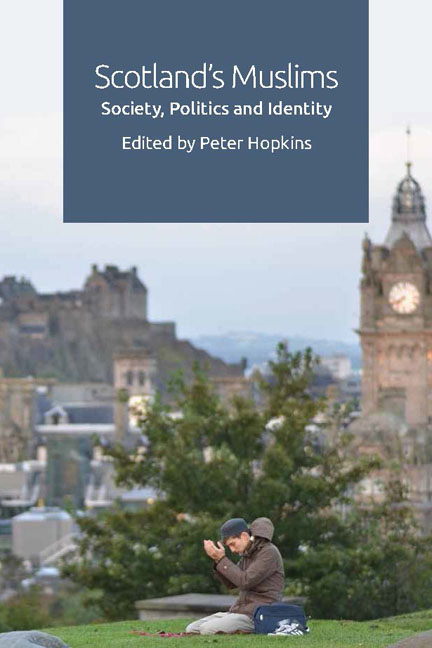Book contents
- Frontmatter
- Contents
- List of Figures and Tables
- Acknowledgements
- Notes on the Contributors
- 1 Introduction Scotland's Muslims: Early Settlement, Current Context and Research Themes
- 2 Health The Health Profile of Muslims in Scotland
- 3 Education Educational Outcomes of Muslim Pupils in Scotland and Parents' Mobilisation of Different Forms of Capital
- 4 Political Participation Young Muslims' Political Interests and Political Participation in Scotland
- 5 Gender and Migration The Role of the ‘Other’ Woman in Shaping the Subjectivities of Recent Muslim Migrant Women to Scotland
- 6 Sexuality Scottish Muslim Gay Men and the Troubling Intersection of Sexuality and Religion
- 7 Young People Muslim Youth in Scotland: Politics, Identity and Multicultural Citizenship
- 8 Generational Relations Gender and Generational Relations for Muslim Women in Scotland
- 9 Heritage Feeling Scottish and Being Muslim: Findings from the Colourful Heritage Project
- 10 Multiculturalism Multiculturalism and Scotland: ‘Bringing the Outside into the Middle’
- 11 Media Muslim Engagement with the Mainstream Media in a Scottish Context
- 12 Representation Representing Islam at the Edinburgh International Book Festival
- 13 Integration Halal Scots: Muslims' Social Integration in Scotland
- Index
7 - Young People Muslim Youth in Scotland: Politics, Identity and Multicultural Citizenship
Published online by Cambridge University Press: 23 June 2018
- Frontmatter
- Contents
- List of Figures and Tables
- Acknowledgements
- Notes on the Contributors
- 1 Introduction Scotland's Muslims: Early Settlement, Current Context and Research Themes
- 2 Health The Health Profile of Muslims in Scotland
- 3 Education Educational Outcomes of Muslim Pupils in Scotland and Parents' Mobilisation of Different Forms of Capital
- 4 Political Participation Young Muslims' Political Interests and Political Participation in Scotland
- 5 Gender and Migration The Role of the ‘Other’ Woman in Shaping the Subjectivities of Recent Muslim Migrant Women to Scotland
- 6 Sexuality Scottish Muslim Gay Men and the Troubling Intersection of Sexuality and Religion
- 7 Young People Muslim Youth in Scotland: Politics, Identity and Multicultural Citizenship
- 8 Generational Relations Gender and Generational Relations for Muslim Women in Scotland
- 9 Heritage Feeling Scottish and Being Muslim: Findings from the Colourful Heritage Project
- 10 Multiculturalism Multiculturalism and Scotland: ‘Bringing the Outside into the Middle’
- 11 Media Muslim Engagement with the Mainstream Media in a Scottish Context
- 12 Representation Representing Islam at the Edinburgh International Book Festival
- 13 Integration Halal Scots: Muslims' Social Integration in Scotland
- Index
Summary
INTRODUCTION
Until recently, much academic and policy research about Muslim youth and politics tended to focus on issues of radicalisation and extremism (Bakker, 2006; Hemmingsen and Andreasen, 2007; Kuhle and Lindekilde, 2010; Spalek and McDonald, 2011), mirroring the political and policy landscape on this issue. While some of these studies attempt to disrupt popular conceptions of the link between Muslim youth and radicalisation, others have assisted in fuelling perceptions of Muslim youth as taking a more politicised stance on religious belief than their parents (Policy Exchange, 2007, cited in Field, 2011: 160). Furthermore, some have attempted to categorise Muslim youth into those who are ‘moderate’, ‘apartist’ and ‘alienated’ (Field, 2011) and, while painting a more complex picture, remain rather rigid and do little to challenge homogenised representations of Muslim youth. Media representation of Muslim youth as either politically apathetic, radicalised or vulnerable to radicalisation further contributes to misconceptions about young Muslim identities and their political agency. Such representations are gendered and embodied, for example with Muslim young men being read as the Asian ‘new folk devils’ (Alexander, 2000), as ‘militant and aggressive’ (Archer, 2003: 81) or as academic and effeminate (Hopkins, 2006).
Recent scholarship on the political participation of young Muslims in Britain has shown that young Muslims are politically engaged and developing new political subjectivities in diverse ways (O'Toole and Gale, 2013). Significantly, political engagement can lead to a sense of belonging and inclusion in Britain (Mustafa, 2015). Hopkins (2007) has explored the ways in which young Muslim men in Scotland engage with mainstream politics and their understanding of how the political system operates. Rather than being apathetic, disengaged and inert, the young men involved in this study in the early 2000s were recognised as possessing a range of carefully considered political opinions, particularly on matters relating to global politics. Building upon this earlier work, we discuss the political participation of young Muslims in Scotland, particularly in the context of the 2014 Scottish independence referendum. In doing so, we challenge problematic assumptions that see young Muslims as apolitical or that having political agency suggests vulnerability to radicalisation. We then report on youth perspectives of politics in the media, focusing on the impact of media representations of geopolitics on young Muslims’ everyday lives.
- Type
- Chapter
- Information
- Scotland's MuslimsSociety, Politics and Identity, pp. 136 - 154Publisher: Edinburgh University PressPrint publication year: 2017



